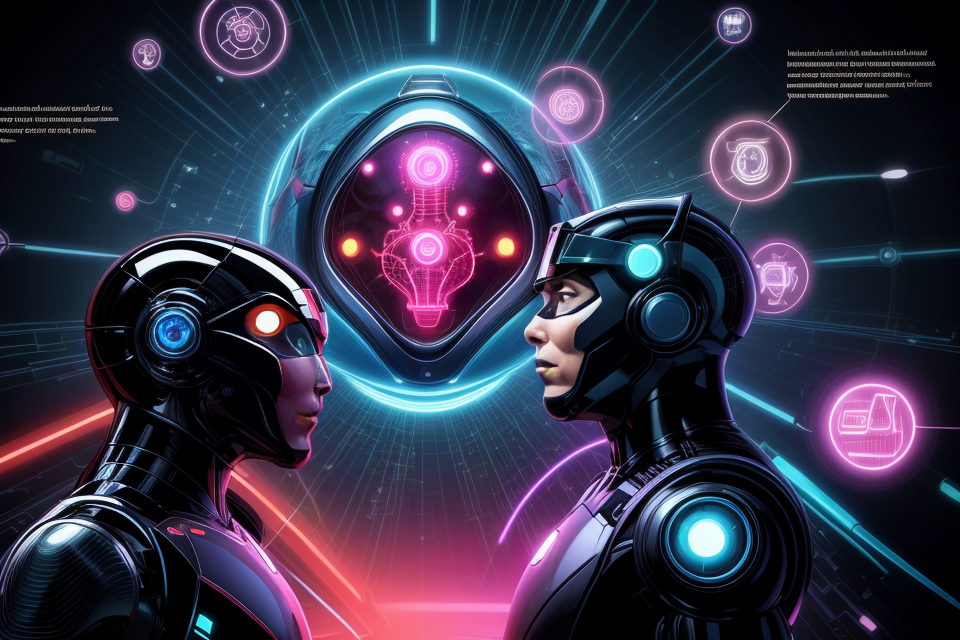
As technology continues to advance, the role of Artificial Intelligence (AI) in our lives is becoming increasingly prevalent. AI is being used in a wide range of industries, from healthcare to finance, and is being hailed as a game-changer in decision making. But, as with any new technology, there are concerns about its reliability and potential consequences. The question remains, should we rely on AI to make important decisions? In this article, we will explore the pros and cons of using AI in decision making and determine if it is truly the future of decision making.
AI, or artificial intelligence, has the potential to revolutionize the way decisions are made in many industries. By analyzing vast amounts of data and identifying patterns and trends, AI can provide valuable insights that can inform decision-making processes. Additionally, AI can automate many routine tasks, freeing up human decision-makers to focus on more complex issues. However, it is important to note that AI is not a replacement for human judgment and expertise. Ultimately, the role of AI in decision-making will depend on the specific industry and application, and it will likely be used in conjunction with human decision-makers for the foreseeable future.
What is AI?
A Definition
Artificial Intelligence (AI) refers to the development of computer systems that can perform tasks that typically require human intelligence, such as visual perception, speech recognition, decision-making, and language translation. These systems use algorithms, statistical models, and machine learning techniques to learn from data and improve their performance over time.
AI is a rapidly evolving field that encompasses a wide range of technologies, including natural language processing, computer vision, robotics, and expert systems. AI is also being used in various applications, such as healthcare, finance, transportation, and manufacturing, among others.
In recent years, AI has gained significant attention due to its potential to transform decision-making processes in various industries. As AI continues to advance, it is increasingly being used to automate decision-making tasks, provide insights, and support human decision-making.
However, it is important to note that AI is not a one-size-fits-all solution, and its effectiveness depends on the specific application and the quality of the data used to train the AI models. Additionally, there are concerns about the ethical implications of using AI in decision-making, particularly when it comes to issues such as bias, transparency, and accountability.
Types of AI
Artificial Intelligence (AI) refers to the development of computer systems that can perform tasks that typically require human intelligence. There are different types of AI, each with its own capabilities and limitations.
- Narrow AI, also known as weak AI, is designed to perform a specific task without any deviation from its intended purpose. It is programmed to perform a particular function, such as playing chess or recognizing speech, and excels in that particular task. However, it lacks the ability to perform tasks outside of its designated scope.
- General AI, also known as artificial general intelligence (AGI), is a type of AI that has the ability to perform any intellectual task that a human being can do. It is designed to be flexible and adaptable, and can learn and perform new tasks as they arise. General AI is still a work in progress, and there are currently no known practical applications of this type of AI.
- Superintelligence refers to a hypothetical form of AI that surpasses human intelligence in all areas. It is still a topic of debate among experts, with some arguing that it is possible to create, while others argue that it is unlikely or even impossible. If it were to exist, superintelligence would have the potential to transform society in ways that are difficult to predict.
The Benefits of AI
Increased Efficiency
How AI Helps Automate Tasks
One of the primary benefits of AI is its ability to automate tasks that would otherwise be time-consuming and error-prone for humans. AI algorithms can quickly process large amounts of data, identify patterns, and make decisions based on that information. This capability can free up human resources to focus on more complex tasks that require creativity and empathy.
For example, in the healthcare industry, AI algorithms can analyze patient data to identify potential health risks and recommend treatment options. This process can be done much faster and more accurately than a human doctor could do manually. As a result, patients receive better care, and doctors have more time to focus on other critical issues.
Streamlining Business Processes
Another way AI increases efficiency is by streamlining business processes. AI algorithms can analyze data from various sources, such as customer feedback, sales data, and market trends, to identify patterns and make recommendations for improving business operations. This can help companies make better decisions about product development, marketing strategies, and customer service.
For instance, an e-commerce company might use AI to analyze customer purchase history and preferences to recommend personalized product recommendations. This can increase customer satisfaction and sales revenue.
In addition, AI can also be used to automate routine tasks such as data entry, inventory management, and scheduling. This can help companies save time and reduce the risk of errors, freeing up employees to focus on more critical tasks.
Overall, the increased efficiency provided by AI can have a significant impact on businesses and industries, helping them to make better decisions, save time, and improve customer satisfaction.
Accurate Decision Making
AI’s ability to analyze data has the potential to revolutionize the way decisions are made. One of the primary benefits of AI is its ability to process vast amounts of data quickly and accurately. This enables AI systems to identify patterns and trends that may be difficult for humans to discern, leading to more informed and accurate decision making.
Additionally, AI systems can process data from multiple sources, including structured and unstructured data, to provide a more comprehensive view of a situation. This allows AI to consider a wider range of factors when making decisions, leading to more well-informed choices.
Another advantage of AI is its ability to make decisions based on facts rather than emotions or biases. AI systems are not influenced by personal opinions or beliefs, and instead rely on data and algorithms to make decisions. This can help to reduce the potential for errors or decisions based on subjective factors, leading to more objective and fair outcomes.
Furthermore, AI systems can continuously learn and improve over time, allowing them to refine their decision making processes and become more accurate as they gain more data and experience. This ongoing learning process can lead to AI systems that are able to make increasingly accurate predictions and decisions over time.
Overall, the ability of AI to analyze data, make decisions based on facts, and continuously learn and improve makes it a promising tool for accurate decision making in a wide range of industries and applications.
Reduced Costs
One of the key benefits of incorporating AI into decision making processes is the potential for reduced costs. There are several ways in which AI can help to lower operating expenses and increase profitability:
- Automation of routine tasks: AI can be used to automate repetitive and time-consuming tasks, such as data entry and analysis. This not only saves time but also reduces the risk of human error.
- Optimization of resources: AI can analyze data and make recommendations for resource allocation, helping to ensure that resources are used efficiently and effectively.
- Predictive maintenance: AI can be used to predict when equipment is likely to fail, allowing companies to schedule maintenance and repair before a problem arises, reducing the need for costly emergency repairs.
- Improved supply chain management: AI can be used to analyze data and make recommendations for supply chain optimization, helping to reduce waste and improve efficiency.
Overall, by automating routine tasks, optimizing resources, predicting equipment failures, and improving supply chain management, AI has the potential to significantly reduce costs and increase profitability for businesses.
The Drawbacks of AI
Lack of Human Touch
One of the primary concerns regarding the increasing reliance on AI for decision making is the lack of human touch. While AI systems are capable of processing vast amounts of data and making decisions based on that data, they are limited in their ability to understand context and nuance.
AI’s Inability to Understand Context
One of the most significant limitations of AI is its inability to understand context. Human decision making is heavily influenced by context, including cultural, social, and historical factors. AI systems, on the other hand, are limited to the data they are trained on and do not have the ability to consider the broader context in which decisions are made. This can lead to decisions that are based on incomplete or inaccurate information, and that do not take into account the complexities of the real world.
The Impact on Employment
Another concern related to the lack of human touch in AI decision making is the potential impact on employment. As AI systems become more advanced and capable of performing tasks that were previously done by humans, there is a risk that many jobs will be automated away. While this may lead to increased efficiency and lower costs, it could also lead to significant job displacement and economic disruption.
In addition, the use of AI for decision making could also lead to a loss of human skills and expertise. As more decisions are made by machines, there may be less need for human input and judgment, which could lead to a decline in the development of certain skills and a loss of valuable knowledge and experience.
Overall, while AI has the potential to revolutionize decision making in many industries, it is important to carefully consider the potential drawbacks and limitations of relying on AI systems, particularly when it comes to the lack of human touch and the potential impact on employment.
Ethical Concerns
As AI continues to play an increasingly prominent role in decision making, concerns have arisen over its ethical implications. The use of AI in decision making raises important questions about the fairness, transparency, and accountability of these systems.
One major ethical concern is the potential for bias in AI algorithms. AI systems are only as unbiased as the data they are trained on, and if that data is biased, the system will be too. This can lead to discriminatory outcomes, particularly in areas such as hiring, lending, and criminal justice. For example, if an AI system used to determine eligibility for loans is trained on data that disproportionately includes applications from wealthy individuals, it may unfairly discriminate against applicants from less privileged backgrounds.
Another ethical concern is privacy. As AI systems collect and process vast amounts of data, there is a risk that sensitive personal information could be exposed or misused. This could include information about an individual’s health, finances, or personal preferences. Additionally, the use of AI in decision making can make it more difficult for individuals to understand how decisions are being made about them, as the processes used by AI systems are often complex and difficult to interpret.
Overall, while AI has the potential to revolutionize decision making, it is important to address these ethical concerns and ensure that these systems are designed and used in a way that is fair, transparent, and respects individuals’ privacy.
Unpredictable Outcomes
As AI continues to evolve and play an increasingly prominent role in decision making, it is important to consider the potential drawbacks associated with its use. One of the most significant concerns is the possibility of unpredictable outcomes resulting from the implementation of AI-driven decision making processes.
- AI’s Limitations: Despite its advanced capabilities, AI is not without limitations. In particular, it may struggle to accurately account for complex, nuanced, or context-dependent factors that can significantly impact decision making. For example, AI algorithms may struggle to understand the social or cultural implications of a particular decision, leading to outcomes that are difficult to predict or manage.
- The Unknown Consequences of AI: Another concern is the potential for unforeseen consequences resulting from the use of AI in decision making. While it is difficult to fully anticipate the impact of AI on complex systems, there is a risk that its implementation could lead to unintended consequences, such as unforeseen economic or social impacts. Additionally, the use of AI in decision making may exacerbate existing biases or inequalities, leading to further social or economic disparities.
Overall, the potential for unpredictable outcomes highlights the need for caution and careful consideration when implementing AI in decision making processes. While the technology has the potential to drive significant benefits, it is important to ensure that its use is guided by ethical and moral principles, and that its impact on society is carefully managed and monitored.
The Future of AI
The Evolution of AI
Artificial Intelligence (AI) has come a long way since its inception in the 1950s. From the early days of rule-based systems to the current era of machine learning and deep learning, AI has seen rapid evolution and growth. In this section, we will explore the history of AI and the current state of its evolution.
How AI is Advancing
One of the key drivers of AI’s evolution is the availability of large amounts of data. With the explosion of data in recent years, AI systems have been able to learn from vast amounts of data, enabling them to make more accurate predictions and decisions. This has led to significant advancements in areas such as natural language processing, computer vision, and robotics.
Another factor driving AI’s evolution is the development of new algorithms and models. For example, deep learning algorithms have enabled AI systems to learn complex patterns and relationships in data, leading to significant improvements in areas such as image and speech recognition. Similarly, reinforcement learning algorithms have enabled AI systems to learn from trial and error, leading to breakthroughs in areas such as game playing and robotics.
Future Trends in AI
Looking to the future, there are several trends that are likely to shape the evolution of AI. One of the most significant is the increasing use of AI in decision-making processes. As AI systems become more sophisticated and capable of processing large amounts of data, they are being used more and more to make decisions in areas such as finance, healthcare, and transportation.
Another trend is the growing use of AI in autonomous systems. From self-driving cars to drones and robots, AI is being used to enable machines to operate autonomously, without human intervention. This has the potential to revolutionize many industries and transform the way we live and work.
Finally, there is growing interest in AI ethics and the potential impact of AI on society. As AI systems become more powerful and capable, there is a need to ensure that they are used ethically and in a way that benefits society as a whole. This includes issues such as bias in AI systems, transparency in decision-making, and the need for accountability and responsibility in the development and deployment of AI.
The Role of AI in Society
AI has become an integral part of our daily lives, from virtual assistants like Siri and Alexa to Netflix’s personalized movie recommendations. The increasing reliance on AI across various industries has raised questions about its role in society and its impact on decision-making processes.
AI’s Impact on Industries
AI has the potential to revolutionize various industries, including healthcare, finance, and transportation. In healthcare, AI can be used to analyze patient data and provide more accurate diagnoses and treatment plans. In finance, AI can be used to detect fraud and make better investment decisions. In transportation, AI can be used to optimize routes and reduce traffic congestion.
The Future of Jobs
As AI continues to advance, there is a concern that it may replace human jobs. While some jobs may be automated, there will still be a need for human input and decision-making. However, AI may change the nature of work, requiring workers to have new skills and knowledge. For example, AI may be used to analyze large amounts of data, freeing up human workers to focus on more complex tasks that require creativity and critical thinking.
Overall, the role of AI in society is likely to continue to grow, and it is important to consider its potential impact on decision-making processes in various industries. While AI may not replace human decision-making, it can provide valuable insights and help improve decision-making processes.
The Future of Human-AI Interaction
As AI continues to advance, the relationship between humans and AI will become increasingly important. In the future, human-AI interaction will be crucial in determining the success of AI systems. Here are some possible scenarios for the future of human-AI interaction:
The Relationship Between Humans and AI
The relationship between humans and AI will be critical in determining the success of AI systems. As AI becomes more advanced, it will be necessary for humans to work closely with AI systems to ensure that they are making accurate decisions. However, there will also be a need for humans to maintain control over AI systems to prevent them from making decisions that are harmful to humans.
The Future of Collaboration
Collaboration between humans and AI will be essential in the future. As AI systems become more advanced, they will be able to perform tasks that are currently beyond human capabilities. However, humans will still be necessary to provide guidance and make decisions that are outside the scope of AI systems. Therefore, collaboration between humans and AI will be critical in ensuring that AI systems are making accurate decisions that align with human values and goals.
Overall, the future of human-AI interaction will be determined by the balance between AI capabilities and human control. As AI systems become more advanced, it will be necessary for humans to work closely with them to ensure that they are making accurate decisions. However, humans will also need to maintain control over AI systems to prevent them from making decisions that are harmful to humans. The future of human-AI interaction will be an ongoing process of finding the right balance between these two factors.
The Role of AI in Decision Making
The Pros and Cons of AI
Pros
- AI can process large amounts of data quickly and accurately, making it an invaluable tool for decision making in industries such as finance, healthcare, and marketing.
- AI can identify patterns and make predictions based on historical data, allowing businesses to make informed decisions about future trends.
- AI can automate repetitive tasks, freeing up time for humans to focus on more complex tasks that require creativity and empathy.
Cons
- AI can perpetuate biases and discrimination if not properly designed and trained, leading to unfair outcomes and decision making.
- AI can lack transparency, making it difficult for humans to understand how decisions are being made and for what reasons.
- AI can be costly to implement and maintain, requiring significant investment in technology and personnel.
The Future of AI in Decision Making
- As AI technology continues to advance, it is likely that its role in decision making will become even more prevalent and sophisticated.
- AI is likely to play a particularly important role in industries that are heavily reliant on data, such as finance and healthcare.
- However, it is also important to ensure that AI is used ethically and responsibly, and that its impact on society is carefully considered and monitored.
Final Thoughts on AI
- While AI has the potential to revolutionize decision making in many industries, it is important to remember that it is not a silver bullet solution.
- AI should be seen as a tool that can augment human decision making, rather than replace it entirely.
- Ultimately, the success of AI in decision making will depend on how it is designed, implemented, and regulated, and on the ethical considerations that are taken into account.
FAQs
1. What is AI?
AI stands for Artificial Intelligence, which refers to the development of computer systems that can perform tasks that typically require human intelligence, such as visual perception, speech recognition, decision-making, and language translation.
2. How does AI work?
AI works by using algorithms and statistical models to analyze and learn from large amounts of data. These algorithms can then be used to make predictions, classify information, and make decisions based on the patterns and insights that they have learned from the data.
3. Is AI reliable?
The reliability of AI depends on the quality of the data it is trained on and the algorithms it uses. While AI can make accurate predictions and decisions based on the data it has been trained on, it can also be biased or flawed if the data is incomplete, inaccurate, or unrepresentative. Therefore, it is important to carefully evaluate and validate the data and algorithms used in AI systems.
4. What are the benefits of using AI?
The benefits of using AI include increased efficiency, accuracy, and speed in decision-making, as well as the ability to process and analyze large amounts of data. AI can also help to identify patterns and insights that may be difficult or impossible for humans to detect, and can provide personalized recommendations and solutions.
5. What are the risks of relying on AI?
The risks of relying on AI include the potential for bias and discrimination, as well as the possibility of malicious use or manipulation of AI systems. There is also the risk of over-reliance on AI, which can lead to a lack of critical thinking and decision-making skills in humans. It is important to carefully consider the potential risks and limitations of AI and to ensure that it is used ethically and responsibly.


